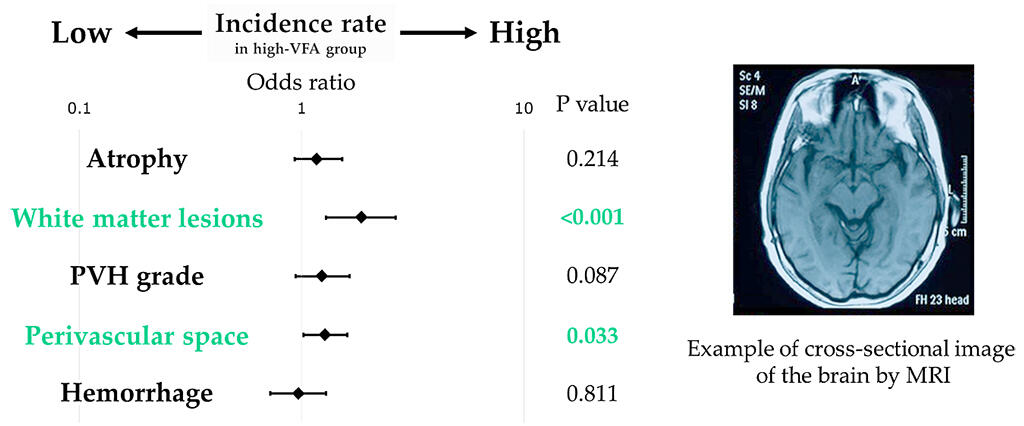A research group led by Professor Shigeyuki Nakaji of Kao Health & Wellness Research Institute and Hirosaki University Graduate School of Medicine conducted a large-scale cohort study on the relationship among visceral fat, cognitive function, and brain structure using the health big data obtained from the "Hirosaki City Ikiiki Medical Examination", which was conducted by the Hirosaki University COI. Those who were aged ≥ 65 years and had a large amount of visceral fat had significantly reduced cognitive function and structural abnormalities in the brain. This suggests that reducing the proportion of visceral fat may contribute to lowering the risk of dementia.
In this study, data of 2364 individuals aged 65-80 years who participated in the "Hirosaki City Ikiiki Medical Examination" conducted from 2016 to 2017, excluding those diagnosed with dementia, were analyzed. Visceral fat proportion was measured using a visceral adipometer, and participants were classified into the high and low visceral fat groups based on the median visceral fat mass. Cognitive function was assessed using a dementia screening test (Mini-Mental State Examination; MMSE). The structure of the brain was examined using MRI for cerebral atrophy, white matter lesions, perivascular lesions, perivascular space enlargement, and cerebral hemorrhage. When comparing these evaluation results between the groups, adjustments were made to avoid the effects of factors previously reported to be related to dementia (hypertension, diabetes, depression, smoking, drinking, etc.).
Consequently, the group with more visceral fat presented lower scores on MMSE and significantly reduced cognitive function than those of the group with less visceral fat. The results were presented after excluding the effects of factors previously reported to be associated with dementia. Visceral fat proportion was significantly associated with cognitive function, independent of these factors. Brain structural abnormalities, including white matter lesions, have been reported to manifest in patients with dementia.

Provided by Kao Corporation
Due to this fact, the relationship between visceral fat and structural abnormalities of the brain was investigated. It was found that the group with a high amount of visceral fat had significantly more white matter lesions and perivascular space enlargement than those with a small amount of visceral fat. Based on this finding, both sides hope to contribute to the health promotion of people worldwide by continuing to explore knowledge about visceral fat from various perspectives.
■ Hirosaki City Ikiiki Medical Examination: A dementia cohort study conducted in Hirosaki City by AMED (Japan Medical Research and Development Organization) (Dementia Research and Development Project) as part of the "Large-scale dementia cohort study aimed to obtain a healthy and long-lived society."
This article has been translated by JST with permission from The Science News Ltd.(https://sci-news.co.jp/). Unauthorized reproduction of the article and photographs is prohibited.




